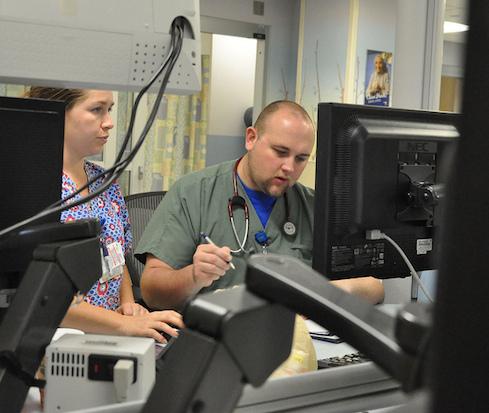EHRs Must Find Zebras Among The Horses
EHRs should be adaptive, so that when something like the Ebola outbreak occurs, the overworked ER doc has help catching the one critical piece of information that wasn't as relevant a year ago.


Mental Health Tools: From Office To Pocket
Mental Health Tools: From Office To Pocket (Click image for larger view and slideshow.)
In my last article for InformationWeek, Will Electronic Health Records Ever Be Usable?, I introduced the American Medical Association's EHR usability priorities, published last month. This time let's dig a little more deeply into some of these priorities.
Events over the last two weeks have brought to light how the usability of electronic health records can affect public health. Thomas Duncan, the Liberian man in Dallas being treated for an Ebola infection, was initially discharged from the emergency room he visited. At first, the hospital blamed the EHR as the culprit for why the ER doc did not know Duncan had recently travelled from Liberia.
One can image how the conversation went:
ER nurse: "I asked the patient about his recent travel, and I documented it in the EHR."
ER doc: "Well, I never saw it."
So the hospital goes public, and because everyone knows there are issues with EHRs, it has an easy scapegoat. Then the EHR vendor points out how the doctor should have been able to see the travel history documented by the nurse. Click, click, click, scroll, scroll, scroll. "See, there it is. It's easy, once you know where to find it."
[The last quarter century of health technology has been a roller coaster. Read 25 Years Of Health IT: Highs & Lows.]
And then the hospital retracts its initial claim that the EHR was to blame.
To be fair, the same scenario could have occurred with paper charts. Ultimately, it's the physician's responsibility to ask about and verify clinically relevant history, even if other support staff has already asked the same questions.
But EHRs are supposed to be better than paper charts, aren't they? And aren't they supposed to help us do our jobs better?
There's also the issue of how Ebola is a zebra that just turned into a horse. What does this mean? How can EHRs help? And how does this relate to the AMA's EHR priorities?
In medicine, we are taught: "When you hear hoof beats, think horses, not zebras." In other words, common conditions are common; rare conditions are rare. So a year ago, when a patient presented to the ER in the United States with abdominal pain and a fever, the doctor might have a differential diagnosis: gastroenteritis/food poisoning, appendicitis, diverticulitis, cholecystitis, pancreatitis, liver abscess, and so on.
In the physician's mind, each of these conditions has a rough probability or likelihood assigned to it. Other considerations, such as age, location, and worsening factors, might make one diagnosis more likely, and other diagnoses less likely. Travel history is one of those considerations. If a patient presents with fever, right upper quadrant abdominal pain, and recent travel to an area where Entamoeba histolytica is endemic, liver abscess might be likelier whereas normally, the likelihood would be pretty low. A year ago, an Ebola infection would have had zero probability of presenting in the US and would not have been anywhere on that list.
However, since the Ebola outbreak in West Africa began earlier this year, Ebola infections have become a very real concern, even here in the US. An EHR could have helped an already overwhelmed ER doc by highlighting the patient's travel history when present with the relevant constellation of symptoms: fever, headache, muscle pain, weakness, diarrhea, vomiting, abdominal pain, and unexplained bleeding or bruising. Each of these symptoms is non-specific, but any of them combined with recent travel to West Africa should have raised a red flag.
This relates directly to the AMA's priority No. 5: that EHRs should "reduce cognitive workload." The AMA points out that most "EHRs focus primarily on data collection rather than synthesis of data at the patient level." Bottom line is, EHRs need to "think" like doctors think. And they need to anticipate the clinical staff's needs like Radar O'Reilly in M*A*S*H.
EHRs should center on the "chief complaint" -- the main reason why the patient is seeing a clinician. With the "chief complaint" as a loose filter, the EHR should help the clinician make sure relevant questions are asked and help focus the doctor on pertinent parts of the physical exam. It should help the physician develop a differential diagnosis, and it should present applicable studies and tests the physician might want to order to rule out these conditions.
Sounds a lot like clinic decision support -- and really it is -- but many of these features can be implemented without advanced data analytics and sophisticated algorithms. Many could be incorporated with fairly simple logic. The point would not be to exclude -- but to prioritize -- how data and information are entered and presented.
Ultimately, EHRs should be adaptive, so that when something like the Ebola outbreak occurs, we don't have make sure the overworked ER doc who is managing a ward full of patients catches the one critical piece of information that wasn't as relevant a year ago. In the future, as usability improves, we will see headlines about how EHRs prevented outbreaks from occurring, not blaming them (even incorrectly) for contributing to a potential disaster.
The owners of electronic health records aren't necessarily the patients. How much control should they have? Get the new Who Owns Patient Data? issue of InformationWeek Healthcare today.
About the Author(s)
You May Also Like
How to Amplify DevOps with DevSecOps
May 22, 2024Generative AI: Use Cases and Risks in 2024
May 29, 2024Smart Service Management
June 4, 2024







